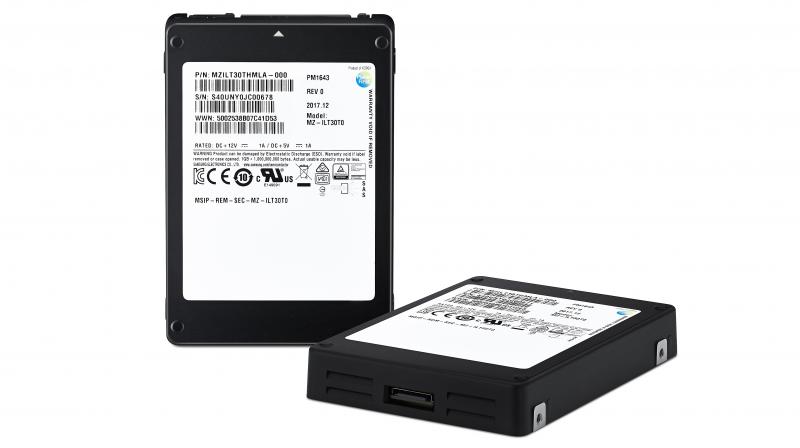World's largest SSD at 30.72TB starts production
This breakthrough was made possible by combining 32 of the new 1TB NAND flash packages, each with 16 stacked layers of 512Gb V-NAND chips.

Samsung has begun mass producing the industry’s largest capacity Serial Attached SCSI (SAS) solid state drive (SSD) – the PM1643 – for use in next-generation enterprise storage systems. Leveraging Samsung’s latest V-NAND technology with 64-layer, 3-bit 512GB chips, the 30.72 TB drive delivers twice the capacity and performance of the previous 15.36TB high-capacity line-up introduced in March 2016.
This breakthrough was made possible by combining 32 of the new 1TB NAND flash packages, each comprised of 16 stacked layers of 512Gb V-NAND chips. These dense 1TB packages allow for approximately 5,700 5GB, full HD movie files to be stored within a mere 2.5-inch storage device.
In addition to the doubled capacity, performance levels have risen and are nearly twice that of Samsung’s previous generation high-capacity SAS SSD. Based on a 12Gbps SAS interface, the new PM1643 drive features random read and write speeds of up to 400,000 IOPS and 50,000 IOPS, and sequential read and write speeds of up to 2,100Mbps and 1,700 Mbps, respectively. These represent approximately four times the random read performance and three times the sequential read performance of a typical 2.5-inch SATA SSD.
Samsung reached this new capacity and performance through several technology progressions in the design of its controller, DRAM packaging and associated software. Included in these advancements is a controller architecture that integrates nine controllers from the previous high-capacity SSD lineup into a single package, enabling a greater amount of space within the SSD to be used for storage. The PM1643 drive also applies through Silicon Via (TSV) technology to interconnect 8Gb DDR4 chips, creating 10 4GB TSV DRAM packages, totalling 40GB of DRAM. This marks the first time that TSV-applied DRAM has been used in an SSD.
Samsung also plans to expand the line-up later this year with 15.36TB, 7.68TB, 3.84TB, 1.92TB, 960GB and 800GB versions to further drive the growth of all-flash-arrays and accelerate the transition from hard disk drives (HDDs) to SSDs in the enterprise market.
Click on Deccan Chronicle Technology and Science for the latest news and reviews. Follow us on Facebook, Twitter.

